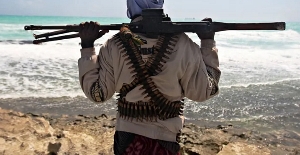In his acknowledgments to his first novel, Wife of the Gods, Kwei Quartey thanks someone for convincing him to set his story in “real-life Ghana” rather than a fictitious “Ghana-like“ African nation. This write up is not a book review but an attempt to examine the extent to which the writer has succeeded in depicting the real Ghana.
The action in this fast paced detective story is set in contemporary Ghana. Here, the police wear gray and black camouflage-like uniform, one cedi is equivalent to one dollar, the Jubilee House and the imposing Mormon temple are mentioned and the ministry buildings in Accra are described as having a “peculiar faded mauve trim”. Mobile phone callers may be met with messages like “the subscriber is out of range”, and when someone shakes hands with you, the middle fingers are snapped. Ask someone when another person will arrive at a place and you get the answer: “soon” which can mean any time from now until several hours later. Welcome to the real Ghana in Kwei Quartey’s world.
Born of an African-American mother and a Ghanaian father and brought up in Ghana by his university lecturer parents, Quartey displays a peculiar interest (almost an obsession) in the Ghana that appeals to the foreign tourist. Several times in the novel (six times, to be exact) you will meet people delicately balancing loads on their heads. There are businesses with typically Ghanaian names: In God We Trust Motors, My Saviour Barber Shop, or Jesus My Soul Chop Bar. Too bad the good doctor-writer misses the most popular of all chop bars in Ghana: Don’t Mind Your Wife Chop Bar. Perhaps that would have been too obvious.
Ghanaian readers will easily recognise themselves in this story. My main problem is where they will find it more difficult to see themselves. The main action is set in the Volta Region, perhaps a few kilometres from Ho, the capital. It is difficult to determine whether the people in the area are Anlo (southern Ewes) or their northern (Ewedome) counterparts. The wife in the title is a trokosi – a wife of the gods. Agbadza, rather than borborbor, is the traditional music of the people. These people will be southern Ewes. Trokosi is most common among the Tongu people in places like Klikor, Mamfe, Agave, or Afife. If so, the people of the fictional Ketanu and Bedome cannot be cocoa farmers since there are no cocoa farms in this area. The Ewes who are likely to be cocoa farmers do not practise trokosi.
Where Ketanu (the name has an uncanny resemblance to Keta), the principal site of action in the novel, is exactly situated in the author’s mental geography is not of much consequence. This, after all, is a work of fiction. But wherever it is situated, the ethnic group that inhabits that location cannot be associated with activities that are not usual to that group. The fact of the narrative being fiction cannot preclude adherence to certain basic facts about the people among whom the story is set, not even for the sake of dramatic effect.
The book opens with the trokosi wife, Efia, going into the bush to harvest plantain to make fufu for her fetish priest husband. This is odd. The fetish priest, Togbe Adzima, is very likely to be a Tongu man. These people do not often eat fufu and the fetish priest is unlikely to ask for some. It is the northern Ewes who eat fufu daily – a habit they share with the Akans. Many traditional northern Ewes don’t regard themselves as having eaten a meal for the day if they have not eaten fufu. An Asante man is likely to express similar sentiments. Not a trokosi practising Tongu man. Northern Ewes may pound a mixture of cassava with a little plantain, but Ewes do not often eat fufu made up only of plantain. I cannot imagine Togbe Adzima, a trokosi priest, eating an all-plantain fufu. The manner in which Efia goes to the grove to get plantain for fufu also looks odd. People don’t decide to eat plantain fufu and then go to the bush to fetch the plantain. Often, the farmer knows the plantain that is ready for harvest long in advance. She cuts it down when it is due and brings it home. She doesn’t wait to do the harvest at the very moment she is going to make fufu. The staple food of the people who practise trokosi is akple (corn flour or corn dough mixed with cassava dough). They will not call this food banku (that is the name non-Ewes call it) and they are not likely to eat it with kontomire! And women may sell (or serve) palm wine but they do not make (tap) it.
It is clear that Quartey doesn’t really know much about rural life in Ghana. He thinks people keep coconuts in the kitchen and offer the milk to visitors who decline a welcoming beer. He keeps talking about the village people going to the same area (one that is a “cluster of trees ravaged by overcutting”) to get firewood as if firewood is like mushroom that keeps on sprouting at the same place. As for me, I can easily see these women going further and further away from the village each day they go out to collect firewood. They would hardly visit the same place repeatedly for firewood. It is unfortunate that some of these cultural misrepresentations are so crucial to the unfolding of the plot.
A village woman goes to a herbalist who prepares a potion in a bottle for her weak blood to be taken twice over two days. The woman pays with two live chickens. That is really not how such things happen in the real Ghana. Herbal treatments that involve “payment” with live animals are often of a ritualistic nature that may take several days. And, often, the animal is killed as part of the rites of treatment. A herbalist in modern Ghana (even a very quack one) who merely prepares a bottle of “blood tonic” for a patient is more likely to take cash payment than two live animals in a poor village setting. No villager will even be willing to pay so much for so little. Quartey gives us the impression that they will do so.
Quartey writes more as an outsider than an insider. His tendency to see Ghana as an exotic place can be a bit irritating. For the non-Ghanaian reader, it doesn’t matter. But for me as a Ghanaian, who comes from the very parts where the action is set, the life there has been part of my daily life and I find nothing exotic in it. I must, however, commend Quartey for withholding himself from a more detailed description of the drumming and dancing scenes than he did. Is that not what the white man knows us for being so fond of? But I guess anyone making a film of the book is not going to miss that opportunity to show us doing what we are best known for.
There are other things Quartey writes about with scant regard for cultural fidelity. Gladys Mensah’s funeral with all those items in the casket which she will use on the journey in the other side and the manner in which Elizabeth was pointed out and beaten as a witch, are all events which anybody who has witnessed them before will see are not faithfully described.
There is no authenticity in the names given to the characters. It is most strange that the trokosi who first comes across Gladys’ body is called Efia. The people who actually practice and believe in trokosi will never name a daughter Efia. Friday born girls among Ewes are called Afi. What Efia, an Akan rendition, is doing as a wife of the gods is difficult to imagine. Akans do not practise trokosi and will never send a daughter to a trokosi priest. Quaye and Ato are not Ewe names and I don’t see what they are also doing as motor mechanics in a village outside Ho. The two herbalists in the story can hardly be called Boniface and Isaac. These herbalists are people who believe in witchcraft and boast of their juju. They would never be seen in church. They would not take Christian names either. Even if they were given Christian names in their youth, they would hardly be proud of using them in their adult lives.
Quartey had a hard time deciding what language to give his characters. When they speak the vernacular, his English rendition of what they say doesn’t sound like anything they could have said in the local language. And when they speak English, it doesn’t sound like English as Ghanaians speak it. As for his pidgin English, the less said about that the better.
I can understand the writer’s problems with rendering some of these things in English. For instance, when Efia reports to Dawson that she had cut off her husband’s penis, Quartey has her saying “... I used a knife to cut his manhood off.” Think back in Ewe and “manhood” is a great rendition of the exact Ewe word Efia must have used. But when she had earlier said: “For a man to rape his own daughter...” you wondered how exactly she said that in Ewe. What is “rape” in Ewe, or, for that matter, Akan or the author’s own Ga? These are problems which all writers using a different language from that used in the action they are describing face. I am not sure if Quartey resolves the problem satisfactorily. I suspect he is not very fluent in any Ghanaian language.
The person who helped him with the translations of the Ewe may be at fault. The Ewe word for “welcome” is “woezo” and not “woizo”. The plural is “miawoezo” and no Ewe will say to two people: Woizo. “Woezo” may be the Ewe equivalent of “Welcome” but it is not used in a manner in which you can say “Woezo back to Ketanu”. That is the kind of thing one writes who is thinking only in English. And, surely, Elizabeth didn’t tell Dawson she felt like having been kicked by a donkey. She must have said by a horse which is more likely to come into her imagination than a donkey – a rare animal in these parts of Ghana. And, oh, the Ewes do not call themselves “Eh-way”. That is what non-Ewes, who cannot pronounce the word correctly, call them.
It is not very easy to say “Please, yes, sir” in Ewe, or in many other Ghanaian languages for that matter. “Sir”, as used in English, has no direct equivalent in Ewe. The respect giving word “please” is common in the vernacular as “medekuku”, “mepawoky3w”, “ofaane” and the author would have done better limiting those speaking vernacular to “please” without necessarily having them adding a “Sir” to it. The police officers can say “Sir” to their senior officers whom they address in English. “Kai” may be an interjection (or swear word) that is common in Ghana but one that will hardly be uttered by an Ewe. There are too many places where there is something in the dialogue which just doesn’t sound like how real Ghanaians carry out conversations with each other in real life. Again, for the non-Ghanaian reader, this wouldn’t matter one bit, but for those of us who know the people he is talking of so well, it bothers us a lot since we have a hard time imagining them in the roles they have been given.
Having said all these, I may stand accused of being overly petty or just nitpicking. I want to state, however, that this is a delightful read. I only wish I were a non-Ghanaian reader, blissfully oblivious to all the ethnographic inaccuracies and feeling the same way I did when reading the No. 1 Ladies detective series being so very far away from Botswana. For those Ghanaians bemoaning the dearth of literary talent in our country and looking with very green eyes at our big neighbours, Nigeria (where are our Ben Okris and Chimamanda Adichies?), Quartey’s work is warmly welcomed. Like a classic whodunit, suspicions keep shifting from one person to another increasing the tension as we keep guessing who killed Gladys (oh, not that Lucy in “When the Heart Decides” and “Who Killed Lucy?”). But who really killed Gladys Mensah? Well, I am not telling. I don’t want to be a killjoy and spoil the fun for you. Get the book and find out for yourself. As for me, I am eagerly waiting for the next in the series of Inspector Darko Dawson mystery stories.
Wife of the Gods by Kwei Quartey, is published by Random House, New York, 2009. It is 317 pages including the acknowledgments and a glossary of words strange to non-Ghanaian readers. The paperback edition is available at $15 at amazon.com. Dr. Kwei Quartey practices medicine in Southern California – “real” medicine, not herbal medicine...
Kofi Amenyo (kofi.amenyo@yahoo.com)
Opinions of Sunday, 29 November 2009
Columnist: Amenyo, Kofi




![Kurt Okraku[L] Andre Ayew and Stephen Appiah Kurt Okraku[L] Andre Ayew and Stephen Appiah](https://cdn.ghanaweb.com/imagelib/pics/279/27934294.295.jpg)









